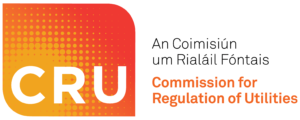The value of economic regulation of the water sector

The Commission for Regulation of Utilities (CRU) is the independent economic regulator of the public water sector in Ireland. We act at all times to protect the public interest and, since 2014, we have regulated the activities of Irish Water, who provide public water and wastewater services to homes and businesses across Ireland.
The absence of competition for public utilities like Irish Water heightens the need for strong, independent regulation to hold Irish Water to account and challenge it to deliver its services efficiently and equitably, in the interests of all its customers. While a focus on efficiency and equity is a key part to the role of the CRU, this complements our customer protection focus for all utility customers.
Through economic regulation, Irish Water are challenged and incentivised to reduce costs and deliver increasingly efficient operations and high levels of customer service. At the same time it is recognised that Irish Water must invest in a balanced and sustained manner as they transform Ireland’s water and wastewater systems to ensure that they comply with environmental standards, and meet the capacity requirements and customer service levels which will support Ireland’s economy and citizens. Ultimately, the bill payer (be it the customer or the exchequer) demands value for money.
Equity
The CRU is responsible for approving Irish Water’s charges to customers across a number of areas. At its core, charges need to be equitable and not unduly discriminate between customer classes (e.g. metered and unmetered customers) or lead to undue cross-subsidy between different sectors (e.g. domestic and non-domestic sectors).
Prior to the establishment of Irish Water, customer charges were managed separately across 34 local authorities and 10 town councils. This led to a wide variety of charge types and charge structures, in many cases anomalous, from county to county. The establishment of a single integrated water utility in the State opened up the opportunity to rationalise and deliver simpler, more equitable charging regimes. The CRU has overseen the introduction of these new policies in the areas of connection charges, non-domestic tariffs and excess use charges.
Connection charging
In 2018, the CRU published a decision on a new national connection charging policy for Irish Water customers. The new charging regime is designed to give customers a consistent level of connection service regardless of where in the country that customer connects to the water and/or wastewater network. It delivers a national, harmonised approach to connection charges with a focus on customer benefits in terms of transparency, accessibility, simplicity and equity.
Non-domestic tariffs
Historically, Irish Water’s non-domestic customers (including mixed-use customers) have been subject to a wide range of pricing levels, categories, methodologies, and billing arrangements. This has resulted in over 500 separate charges across Ireland.
The CRU published a decision on a new Non-Domestic Tariff Framework in July 2019. The new charges will be rolled out over the coming months. The CRU worked closely with Irish Water to deliver a policy for a harmonised suite of tariffs for non-domestic water and wastewater customers with a focus on equity, simplicity and transparency for the circa 180,000 businesses that are connected to Irish Water’s network. Around half of these customers will see immediate bill reductions. Nevertheless, a core element of the framework is a set of transition arrangements for customers who will see significant increases in their water charges.
Excess use charges
The CRU published its decision on excess use charges in 2018. This followed the removal of domestic water charges and, to meet the requirements of the Water Framework Directive, the subsequent legislation for charges for households with the highest water use. At its core, the charge encourages households to conserve water and, where possible, identify and fix leaks in their water supply. Households that use more than the free allowance of 213,000 litres will be charged for use on a volumetric basis, unless they are entitled to additional allowances or exemptions. The charges have been structured so as to ensure equity for customers, including those that have a meter and can track their usage, and those that do not.
For the most part, the highest household water users have leaks on their property and advance notice of the excess usage charge will provide customers the opportunity to either fix the leak themselves or avail of Irish Water’s ‘first fix free’ scheme.
Cost efficiency
The CRU challenges Irish Water to look, year-to-year, for economic efficiencies that will benefit customers. The utility must provide more for less – it must constantly seek to provide greater service and quality to its customers at a lower cost.
“Charges need to be equitable and not unduly discriminate between customer classes.”
The necessity for cost efficiencies must be balanced against other principles, e.g. a stable environment for the utility to operate, environmental compliance and sustainability for current and future customers of the utility. In August 2020, the CRU finalised its decision on Irish Water’s operating and capital expenditure for the five-year period 2020-2024. This is known as a revenue control, i.e. a regulatory contract whereby Irish Water commit to delivering a set of outputs and outcomes in return for a certain level of funding, for the five-year period.
Revenue controls establish efficient costs for delivering a set of outcomes and outputs, taking account of the maturity of the utility. The CRU benchmarks Irish Water against comparable utilities to establish what should be the cost of providing services and building new infrastructure. We also provide incentives for Irish Water to achieve operating and investment efficiencies. Incentives provide management with focus for their actions in areas that will improve performance. These benefits are transferred to customers in the longer term.
Similarly, the CRU may claw back inefficient spend that happened in one regulatory period by reducing the budget in a subsequent period. The threat of having to operate with a reduced budget acts as a powerful motivator to operate efficiently and to innovate to the benefit of the customer.
Irish Water has now commenced its first full five-year revenue control (RC3) period. Despite the constraints placed on Irish Water at its creation, it has managed its business reasonably well, driving down costs.
Historic underinvestment has meant serious deficiencies remain in its asset base and there is a clear compliance deficit across water and wastewater. For example, the Environmental Protection Agency (July 2020) found that 1.1 million people in the State are served by treatment plants that are at risk of failure. It also warned of the lack of resilience in the system as a whole.
Despite this, the CRU notes the progress that has been made in the past few years and the important role that regulation and good governance has played in establishing a single public water utility. The CRU accepts that Irish Water still faces significant challenges with respect to improving the quality and security of the public water and wastewater services in Ireland and providing a better level of service to customers. We will continue to challenge, monitor and hold Irish Water accountable to its customers into the future.
Further details on these key policy decisions and further information on the customer protection role of the CRU can be found at www.cru.ie






